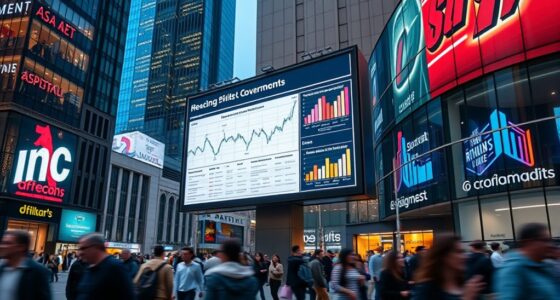You might think that all sectors will weather economic shifts equally, but the reality is quite different. As consumer confidence wanes, certain categories are poised for sharper cuts than others, especially those relying heavily on discretionary spending. This trend could reshape market dynamics in ways you haven’t yet considered. Curious about which industries will bear the brunt and how you can prepare? The upcoming analysis offers insights that could influence your strategic decisions.
Key Takeaways
- Luxury goods, travel, and high-end electronics are expected to face the deepest sales declines due to reduced consumer spending.
- Non-essential retail sectors will experience significant cutbacks as consumers prioritize affordability and value.
- Discretionary categories like entertainment and luxury services will see the largest revenue reductions.
- Premium-priced and non-essential product lines may be heavily impacted by tightened budgets.
- Essential sectors such as groceries and healthcare will remain more stable but may still see slight decreases.

What can you expect from the economic landscape in the fourth quarter of 2025? As the year winds down, market analysts anticipate a cautious environment marked by tighter budgets and shifting consumer behaviors. Consumer spending, a key driver of economic activity, is expected to slow as households become more selective with their expenditures. This shift will influence market trends, making it clear that businesses need to adapt quickly to survive the upcoming quarter. You’ll likely see a decline in discretionary spending, especially in categories that are not deemed essential. Retailers and service providers should brace for reduced foot traffic and sales in non-essential sectors, prompting a reassessment of promotional strategies and inventory management.
In terms of market trends, the fourth quarter will probably highlight a move toward cost-conscious consumption. Consumers are forecasted to prioritize value and durability over luxury or impulse buys, which means brands that can position themselves as offering the best bang for the buck will fare better. Companies that rely heavily on premium pricing or non-essential products might experience the deepest cuts in their revenues. This decline in consumer spending is partly driven by lingering economic uncertainties, inflation pressures, and potential interest rate hikes by central banks, all of which tend to tighten disposable incomes. As a result, you’ll see a shift toward more affordable options, with shoppers scrutinizing receipts and hunting for discounts more than ever.
Market trends suggest that sectors like travel, luxury goods, and high-end electronics could face substantial downturns. These categories are traditionally sensitive to economic fluctuations, and in a cautious spending environment, they are likely to see the deepest cuts. Conversely, essential categories such as groceries, healthcare, and basic household supplies may remain more stable, but even these could experience slight pullbacks if consumer confidence dips considerably. Retailers should prepare for a potential squeeze on margins, especially if inventory levels are high and consumers become more selective about their purchases. For businesses, the key will be to identify which categories are most vulnerable and to develop strategies that mitigate risks, like promotional offers or diversifying product lines.
Furthermore, understanding the benefits of wood-burning stoves as an efficient heating solution can be a strategic move for businesses offering home improvement or energy-saving products, especially as consumers look for cost-effective ways to reduce expenses.
Conclusion
As you navigate Q4 2025, remember that the economic storm clouds threaten sectors like travel, luxury goods, and high-end electronics. Just as a ship must adjust its sails to the wind, you should pivot your strategies toward value-focused offerings and flexible promotions. In a market where consumer confidence wanes, staying adaptable becomes your lighthouse—guiding you safely through turbulent waters toward steady shores. Embrace change, and let resilience be your compass.









